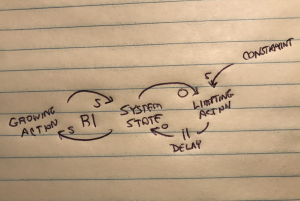One cornerstone of your management style that can make a huge difference in the way you are perceived, received, and respected is the simple act of making yourself available. This probably sounds easy, right? Is it easy?
Let me give you two examples that are likely familiar to you personally. I once worked for a senior manager that simply could not make it to meetings on time. This was common knowledge and frequently discussed among those that worked for this manager or in that group. In fact, it became a bit of a joke and meeting organizers even considered giving the manager a false start time in hope of starting the meeting at the true start time. This is a prime example of a manager not making himself or herself available and quite frankly, disrespecting everyone involved in each meeting.
The second example occurred after a key merger involving a business that I previously worked for. I flew to New York to meet a brand new team, including our new SVP, my new boss. We had one of those large meetings where there was much hoopla, introductions, and the usual positive words about the future. After lunch, I walked down the hall to my boss’s office for an impromptu hello. He said to come in and as I began conversing he was constantly typing on the keyboard, glancing at his screen, and basically, just not respecting the time we were sharing in that moment. I felt very uncomfortable and unimportant. Granted, this was an impromptu meeting and he may have been involved in something, but if that was the case, he could have simply stated that and suggested another time. This left an impression on me, and it was not positive.
The Art of Being Available
The above example demonstrates a case where a manager was simply not available to a team member. There are many ways a manager can fail at making himself or herself available, and all of those ways cost a manager in terms of respect and effectiveness, and leave an opportunity of real connection and true communication on the table. So, as a manager, what are some steps you can take to ensure that you make yourself available to others, and in doing so, increase your effectiveness as a leader and build trust and respect in your organization?
#1 – Go to their Office
When possible, meaning, if you are having a meeting with just one person on your team, schedule the meeting in their office instead of your own. This includes some of those “drop by” meetings you might want to have as well where you just pop into their office for a quick chat. Going to their office shows that you don’t mind coming to them to meet and helps them avoid feeling put off by the “power” of your office. Of course, if your team members have cubicles and you need privacy, then this may not be possible, but it is a great practice for establishing rapport when you can do this.
#2 – Eliminate Distractions
When you are meeting with someone, eliminate as many possibilities of distraction as possible. For example, if you are indeed in your own office, move around the desk and sit in a chair facing the person you are meeting with so that you are not near your screen or phone. If you are in a team member’s office, ask them to sit with you or sit in a way that directs them towards you.
When having a meeting, put your phone on “do not disturb” and ensure that any alarms that sound when you receive an email, etc. are silent (FYI – eliminating the “pop up” windows or alarm for new emails is likely one of the most significant things you can do to improve your own productivity – don’t let email drive your agenda). Whatever you do, don’t take a call, or stop in the middle of the meeting when you remember you need to do something. If you must, stop and reschedule respectfully.
#3 – Eliminate Barriers to Your Schedule and your Office
Allow others to schedule meetings with you directly either by verbal or written (email) request or by scheduling on your calendar. If you have an assistant, make sure your direct reports know that your assistant may be a barrier for those outside the company getting to you, but not for them. Don’t set your assistant up as a gatekeeper for those that work directly for you.
Likewise, if you are going to claim to have an open-door policy, then demonstrate a commitment to this by welcoming those direct reports that need to stop by for a quick update or question. You can establish boundaries for these things of course by indicating specific times of day this is welcome, limiting easy access to direct reports, indicating that if the door is closed this is not acceptable, or simply by being honest if you are busy and suggesting a specific time that will work. However, again I would say that forcing people to “check with your assistant” is a sign that you are not available to your direct reports.
#4 – Actively Listen (stay engaged)
There are many reasons that managers sometimes fail to listen to those speaking with them. Sometimes your mind is just on something else. Sometimes you are just thinking ahead of those speaking with you because of your relevant experience. Sometimes you may just not care what they are speaking about. Regardless of the reason, it is important to actively listen to those speaking with you and demonstrate respect to them.
If you are consumed by something else going on, let that person know that you would like to reschedule for a time where you can give them your full attention. If you find yourself moving ahead of them in thought, listen anyway and then help them move through the steps you can already plainly see and ask them questions to help them discover new experience for themselves. If you don’t care, well, you probably should because they work for you!
#5 – Be On Time for Meetings
You probably figured I would address this based on my example above. Yes, it’s true. Being available means being on time for scheduled meetings. Sure, I worked as a senior executive and understand that occasionally things just come up. But, for the majority of time, you can plan well so that you are on time. Don’t constantly schedule back-to-back meetings. Leave a buffer. If you do have to schedule meetings for 1pm, 2pm, and 3pm, then schedule them for 45 minutes to leave wiggle room. Whatever you do, show up promptly to demonstrate that you are clearly respectful of everyone’s time. Nothing says, “I’m more important than all of you” louder than forcing everyone to wait.
#6 – Be Authentic
The last step I would suggest in making yourself available is simply to be the “authentic you.” Those that work for you should know the authentic person that you are and should see that authentic you as fully present when speaking with them. It is easy to create a “manager” persona that you believe is required in order to stay in control or to separate yourself from those you manage. I don’t buy into this at all. Once you go down that road, you will always have to think about how this manager persona would act instead of just growing as a person and being yourself.
I am saying this because when those working for you interact with you, they can sense whether “you” are truly available as a person to them or whether they are just speaking to a position on the organization chart. People can also sense when you are really not present and mindful of the present conversation. Being available and truly authentic creates a true environment to build trust and loyalty.
WIIFM – The Payoff
Do you want to know “what’s in it for me?” (WIIFM). There is a big payoff in making yourself available to those that work for you. When you are truly available, direct reports will:
- Grant you respect
- Feel valued as an equal human
- Increase their loyalty to you and your ideas/actions
- Be more honest with you
- Be more engaged with their job
Are those scientific facts? No, but those observations come from direct feedback of many employee conversations and my experiences of success and failure in leading teams over the years. Every manager is busy. Every manager has deadlines, meeting, and certainly juggling many tasks and goals. However, investing a little extra effort in making yourself available to your team can go a long way in building trust, building loyalty, and actually increasing productivity through clearer communication and focus. Try it yourself and you will see a difference.

